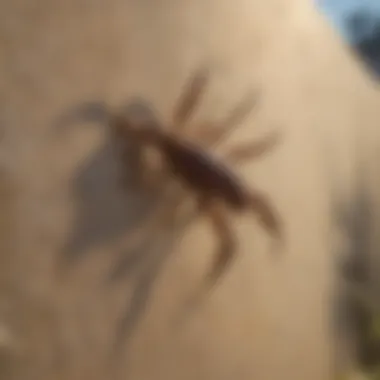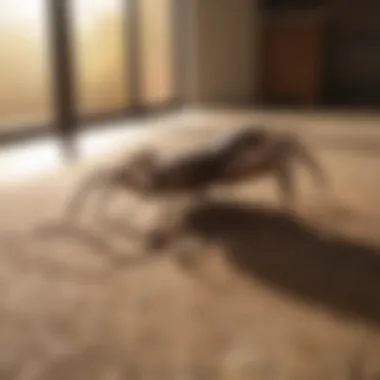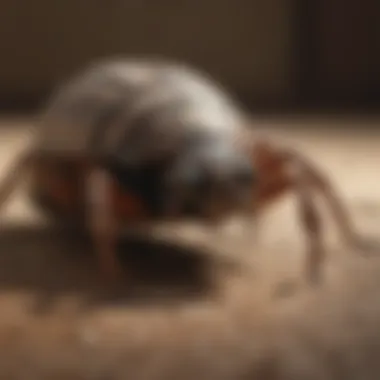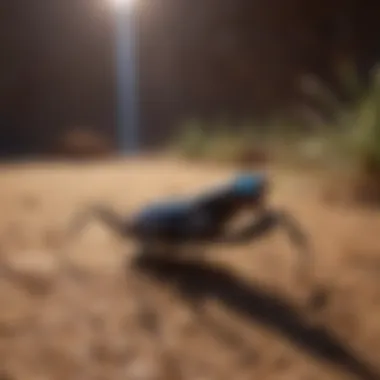Mastering Scorpion Pest Control: A Comprehensive Guide


Preventive Pest Control Strategies
When it comes to safeguarding your home against scorpion infestations, implementing preventive pest control strategies is paramount. One essential aspect of effective pest control is focusing on your house's exterior protection. This involves meticulous attention to detail, such as sealing cracks found in walls or foundation to prevent scorpions from entering. Clearing debris from around your property also plays a crucial role in reducing potential hiding spots for pests. Additionally, taking proactive measures to prevent pests from entering your home through cracks or gaps is key to maintaining a pest-free environment.
For comprehensive yard maintenance, it is vital to establish essential routines that keep your yard pest-free. Regularly mowing the lawn, trimming vegetation away from the house, and removing clutter that may attract pests are all essential practices. Indoors, prioritizing cleanliness is crucial in creating a pest-resistant environment. Utilizing expert cleaning tips and techniques can help eliminate potential hiding spots for scorpions and other pests.
Proper garbage disposal is another critical element of preventive pest control. Efficiently disposing of waste not only eliminates food sources for pests but also reduces the attractiveness of your property to scorpions. Emphasizing the importance of proper garbage disposal to all household members can significantly impact pest control efforts. Moreover, exploring innovative ways to safeguard your home, such as utilizing environmentally friendly products or implementing advanced pest prevention technologies, can further fortify your property against scorpion infestations.
Understanding Scorpions
Scorpion Behavior Patterns
Nocturnal Activity
Nocturnal activity is a key aspect of scorpion behavior that significantly influences their interactions with humans and the environment. Scorpions are primarily nighttime creatures, preferring to hunt and move under the cover of darkness. This behavior is essential to acknowledge in pest control efforts, as it dictates when scorpions are most active and likely to encounter residential spaces. Understanding their nocturnal tendencies helps in implementing targeted intervention strategies during peak activity hours, enhancing the efficiency of pest control measures.
Preferred Habitats
Scorpions exhibit distinct preferences for their habitats, gravitating towards environments that offer ideal conditions for shelter and hunting. By identifying these preferred habitats, individuals can proactively safeguard their homes against potential infestations. Common habitats favored by scorpions include dark, secluded areas such as within cracks in walls, under rocks, or in cluttered storage spaces. Recognizing and mitigating these attractive environments is paramount in preventing scorpion intrusion, making it a focal point in effective pest control strategies.
Identifying Scorpion Species
Common Types
Different regions may host various common types of scorpions, each with unique characteristics and behaviors. Recognizing the prevalent scorpion species in a particular area is essential for implementing tailored pest control solutions. Understanding the habits and traits of these common types guides individuals in choosing appropriate preventive measures and treatment methods, optimizing pest control outcomes.
Characteristics


Scorpions possess distinctive characteristics that influence their behavior and interactions with their surroundings. Characteristics such as size, coloration, and venom potency play crucial roles in designing targeted pest control approaches. By comprehensively understanding the distinguishing features of scorpions, homeowners can make informed decisions regarding the most effective pest control measures to adopt, ensuring optimal protection against these arachnid pests.
Preventive Measures
Preventive measures play a crucial role in the effective pest control specifically designed for combating scorpions. By implementing preventive strategies, homeowners can proactively defend their homes against potential scorpion infestations. These measures encompass a range of tactics aimed at creating an inhospitable environment for scorpions, deterring them from entering and establishing nests within the premises. The importance of preventive measures cannot be understated, as they serve as the initial line of defense in warding off these potentially dangerous arachnids. Homeowners can significantly reduce the risk of scorpion encounters by adopting a comprehensive approach to pest control.
Sealing Entry Points
Caulking Cracks:
Caulking cracks involves sealing off potential entry points that scorpions may exploit to gain access to the indoors. The meticulous application of caulk to crevices and gaps in walls, floors, and foundations helps create a barrier that prohibits scorpions from infiltrating living spaces. Caulking serves as a durable and long-lasting solution for sealing entry points, preventing not only scorpions but also other pests from breaching the home's defenses. Its versatility and effectiveness make it a popular choice for homeowners looking to fortify their homes against scorpion intrusions.
Weather Stripping:
Weather stripping contributes significantly to the overall goal of preventing scorpion infiltrations by sealing gaps around doors and windows. By applying weather stripping to these vulnerable areas, homeowners can eliminate potential entry points that scorpions could exploit to gain access indoors. This method not only helps in pest control but also aids in improving energy efficiency by enhancing insulation. Weather stripping is a practical and efficient solution that offers dual benefits of pest prevention and energy savings.
Reducing Attractants
Eliminating Clutter:
Eliminating clutter is a key aspect of reducing attractants for scorpions, as clutter serves as potential hiding spots for these pests. By decluttering indoor and outdoor spaces, homeowners can remove hiding places that scorpions find appealing, thereby making the environment less hospitable for them. Adopting a clutter-free lifestyle not only discourages scorpions from taking up residence but also promotes better organization and cleanliness in the home.
Proper Waste Management:
Proper waste management plays a significant role in reducing attractants for scorpions by eliminating potential food sources. By securely storing trash in sealed containers and disposing of organic waste promptly, homeowners can minimize the availability of food that may attract scorpions. Maintaining a hygienic living environment through proper waste management practices not only aids in pest control but also contributes to overall household sanitation.
Outdoor Maintenance
Trimming Vegetation:


Trimming vegetation around the property perimeter is essential for minimizing harborage sites for scorpions. Overgrown vegetation provides ideal hiding spots for scorpions and other pests, increasing the likelihood of infestations. By regularly pruning plants, bushes, and trees near the home, homeowners can reduce potential habitats for scorpions and enhance visibility around the property, making it less conducive for these creatures to thrive.
Stacking Firewood:
Stacking firewood properly is crucial in preventing scorpion infestations, as piles of wood create shelters for these arachnids. By neatly stacking firewood away from the house and off the ground, homeowners can eliminate potential nesting sites for scorpions. Properly stored firewood not only helps in pest control but also prevents moisture buildup and wood decay, ensuring its quality for future use.
Natural Remedies
In the realm of pest control for scorpions, natural remedies play a vital role in combating these potentially dangerous creatures without harming the environment or introducing harmful chemicals into your living space. Natural remedies are preferred by many individuals seeking effective pest control solutions due to their non-toxic nature and minimal impact on health. When dealing with scorpions, opting for natural remedies can be a safe yet potent approach that aligns with eco-friendly practices.
Essential Oils
Lavender Oil
Lavender oil stands out as a key player in the realm of natural pest control, particularly against scorpions. Its soothing scent is appealing to humans but repels scorpions, making it a popular choice for those looking to deter these arachnids naturally. The key characteristic of lavender oil lies in its dual functionality as a natural air freshener and pest deterrent, adding a pleasant aroma to your surroundings while keeping scorpions at bay. The unique feature of lavender oil is its calming properties, contributing to a relaxing atmosphere in your home while serving as an effective scorpion repellent. However, it is important to note that while lavender oil is effective in deterring scorpions, its scent may diminish over time, requiring consistent reapplication for optimal results.
Cedarwood Oil
Cedarwood oil is another potent natural remedy for scorpion control, offering a robust defense against these arachnids. The distinctive characteristic of cedarwood oil is its strong woody aroma, which not only repels scorpions but also adds a refreshing earthy scent to your home. This natural deterrent is favored for its long-lasting effects, providing continuous protection against scorpions when applied strategically. The unique feature of cedarwood oil lies in its ability to create a barrier that scorpions find inhospitable, preventing them from infiltrating your living spaces effectively. However, while cedarwood oil is highly effective in repelling scorpions, it is essential to dilute it properly to avoid skin irritations and ensure its safe use in a household setting.
Diatomaceous Earth
Application Methods
Among the various natural remedies for scorpion control, diatomaceous earth stands out for its practical application methods that contribute to a comprehensive pest management strategy. The key characteristic of using diatomaceous earth lies in its abrasive texture, which damages the exoskeleton of scorpions upon contact, ultimately leading to their demise. This unique feature makes diatomaceous earth a popular choice for controlling scorpion populations indoors and outdoors, providing a non-toxic yet lethal approach to pest eradication. However, it is essential to apply diatomaceous earth meticulously in areas frequented by scorpions, ensuring thorough coverage for optimal effectiveness while minimizing its exposure to pets and humans.
Effectiveness


When considering the effectiveness of diatomaceous earth in combatting scorpions, its contribution to overall pest control efforts cannot be understated. The key characteristic of diatomaceous earth lies in its ability to dehydrate and kill scorpions through physical means, making it a highly efficient and sustainable solution for pest management. This unique feature of diatomaceous earth sets it apart from conventional pesticides by targeting scorpions specifically and offering long-lasting protection against these arachnids without adverse effects on the environment. However, while diatomaceous earth is incredibly effective in controlling scorpions, it is crucial to reapply the substance periodically, especially in areas prone to moisture accumulation, to maintain its potency and preserve its pest-repelling properties.
Professional Services
In the realm of pest control, Professional Services play a significant role in ensuring the effective management of scorpion infestations. Engaging professional services offers homeowners specialized expertise and access to advanced tools that may not be readily available to the average consumer. When it comes to combating scorpions, the nuanced knowledge and experience of pest control professionals are invaluable in identifying, addressing, and preventing infestations.
Inspection and Assessment
Risk Evaluation
Risk Evaluation is a pivotal element in the pest control process as it allows professionals to determine the level of threat posed by scorpions to a specific property. By conducting a thorough Risk Evaluation, experts can assess factors such as environmental conditions, existing infestation levels, and vulnerabilities that may attract scorpions. This meticulous assessment aids in devising targeted treatment plans and preventive measures tailored to the unique needs of each homeowner. While Risk Evaluation serves as a cornerstone of effective pest control, it is essential to acknowledge that its accuracy and reliability heavily influence the success of subsequent control strategies.
Infestation Levels
Understanding Infestation Levels is crucial in gauging the extent of scorpion presence within a property. Pest control professionals utilize cutting-edge technologies and methodologies to quantify the size and distribution of scorpion populations accurately. By delving into the intricacies of infestation levels, experts can craft precise eradication strategies that address not only current infestations but also mitigate the risk of future incursions. Additionally, assessing infestation levels enables professionals to determine the most suitable treatment approaches, whether through targeted localized interventions or broader integrated pest management solutions.
Treatment Plans
Chemical Control
Chemical Control involves the strategic application of pesticides and insecticides to eliminate scorpions effectively. Pest control experts leverage specialized formulations that target scorpions while minimizing environmental impact and ensuring the safety of residents. The meticulous selection and administration of chemical agents are key aspects of this control method, as precise dosages and application techniques are imperative for optimal results. While chemical control offers rapid and conclusive eradication of scorpions, ongoing monitoring and assessment are essential to assess efficacy and address any potential reinfestation risks.
Barrier Methods
Barrier Methods create physical impediments that deter scorpions from entering homes and outdoor spaces. By installing barriers such as mesh screens, weather-stripping, and sealing cracks, homeowners can fortify their properties against scorpion intrusion. The effectiveness of barrier methods lies in their ability to act as proactive deterrents, preventing scorpions from accessing indoor environments and nesting sites. While barrier methods provide a sustainable and environmentally friendly pest control solution, regular maintenance and upkeep are essential to ensure their continued efficacy.
Follow-up Maintenance
Monitoring Progress
Monitoring Progress involves continuous supervision and evaluation of pest control measures implemented within a property. Through systematic monitoring, pest control professionals track the effectiveness of treatment plans, assess any changes in infestation levels, and make modifications as needed. This iterative approach allows for timely adjustments to control strategies, ensuring consistent progress towards scorpion eradication and long-term prevention. By closely monitoring progress, homeowners can proactively address emerging issues and maintain a pest-free environment.
Preventive Measures
Implementing Preventive Measures is essential in safeguarding homes against future scorpion infestations. By incorporating practices such as sealing entry points, reducing attractants, and maintaining outdoor spaces, homeowners can create an inhospitable environment for scorpions. Preventive measures serve as proactive defenses that bolster the efficacy of treatment plans and barrier methods, cultivating a comprehensive pest control strategy. While preventive measures require diligence and consistency, their preventive benefits far outweigh the effort invested, ensuring long-term protection against scorpion incursions.



